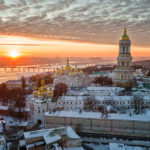The gym in my Kyiv neighborhood is abuzz with feverish discussion. Russia, for the eighth time in recent months, has flung a barrage of missiles at Ukrainian civilian targets. Seventy-six missiles this time. One man is talking so fast I can’t understand him. My friend, Sergei, tells me he’s upset because of the war. I sympathize. Of course he is. However, his racing words don’t produce much understanding, let alone hope.
As I leave the gym, I shake their hands and extend a blessing of peace in Christ. My mind turns to another Ukrainian friend, Pastor Bogdan, and my recent visit to his church. Pastor Bogdan serves a small church in a town northeast of the capital city, Kyiv. But I remember his words as hopeful. He faithfully repeats the good news of Jesus to those in his community, followed by actions that break down barriers to Christ’s gospel.
On the morning when we pulled into Pastor Bogdan’s town a few weeks back, my wife rolled down the window to ask a local man where the Baptist church was located. Without hesitation, he pointed to the west. When we still couldn’t find it, we asked several others before finally calling Pastor Bogdan to direct us. We were surprised that everyone we asked already knew about the church and seemed comfortable with its presence in their town. Normally, smaller towns are suspicious of Protestant evangelicals. Why isn’t it that way here? we wondered.
Care for Others
As we get out of our car, having followed Pastor Bogdan from the town center to his church, an older woman approaches. “My son, can you help my family with some blankets?” she asks him. “Yes, we can, after the worship service,” he assures her. She nods and smiles. Bogdan takes us into a building near the front of the church property. One room contains bags of groceries—humanitarian aid for the townspeople. Another is furnished with assorted old tables and chairs, set up as a makeshift Sunday school room.
“We’ve been meeting baptismal candidates here and catechizing about 10 of them,” he notes. The church has been conducting multiple weekly services to hundreds in the town for months, sharing the love of Christ, the gospel, and humanitarian aid. Some have started coming to the Sunday morning worship service and some to the baptismal classes.
The church has been conducting multiple weekly services to hundreds in the town for months, sharing the love of Christ, the gospel, and humanitarian aid.
Together with the older woman, we walk into the adjacent church building. It’s almost full, about 130 people, and bustling with conversation. A toddler walks down the center aisle and catches my eye. I crouch to talk with her for a moment, realizing how much I miss my grandchildren.
The room is warm, not only because of the kind people but also because of the wood-burning stove along a side wall. Bogdan explains that they make and sell them in his town, a necessity resulting from Russia’s attacks against the power grid and civilian infrastructure. In fact, Bogdan’s congregation is buying many stoves to give to the needy. The church also serves as a “warming center” for anyone looking to get out of the cold.
Hope in Christ
We find our seats and the service starts with prayer to the God who protects the defenseless. The songs, announcements, and prayers are a mixture of Russian and Ukrainian, the latter relatively new to the region. My time comes to preach. I open my Bible to Romans 5:1–11, describing the normal Christian life that’s founded on justification in Jesus Christ by faith.
We rejoice in this gracious standing with God, which gives us both peace with him and the hope of glory. But we also rejoice, knowing suffering results in growing conformity to Christ. This transformation is a sure sign that we’re truly his, which gives us still more hope of glory.
After the sermon, Pastor Bogdan leads in a time of communion. As the bread is passed, commotion ensues in the row in front of us because one more sister has repented and is receiving the bread and wine for the first time. We marvel at the simple preaching of the gospel and loving of neighbors that draws many to our Lord. Not at all flashy. But life-changing. Christ in us, the hope of glory.
Another Glory
Many Ukrainians want to see this country victorious over imperialistic Russia. We want this too. They cry “Slava Ukraini”(“Glory to Ukraine”). While we understand their sentiments, we want another glory for Ukrainians—and for all peoples, including Russians. We desire the glory God offers us. It’s the glory that the Son of God temporarily left, taking the form of a baby and lying in an animal feeding trough. And it’s the glory to which he’s returned, to prepare a home for us.
We marvel at the simple preaching of the gospel and loving of neighbors that draws many to our Lord.
In the meantime, we gather for worship to stir up one another to love and good deeds (Heb. 10:24). Why? Because we believe our good works glorify God the Father. Because Christ through his Spirit is nurturing us and preparing us for that eternal home. And because the Spirit’s love that’s overflowing in our hearts shows others we’re truly Christ’s disciples. Seeing this love encourages them to join us in the journey to that eternal dwelling—to share our hope of future glory.
If we realized what Christ’s gospel means for this suffering world, we too would be loving our neighbors and friends in tangible, meaningful ways. We might even talk so fast they wouldn’t understand us at first. But our reasons for doing so would be quite different from my Ukrainian friend at the gym. Because the news we have doesn’t overwhelm us with fear. It’s good news that fills us with hope.





























